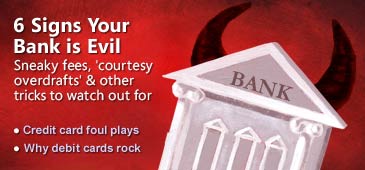Banks have to make money to stay in business. I was an economics major, so I get that.
What I don't get is why so many consumers do nothing as banks get bolder and bolder about picking their pockets. It's no longer nickel-and-diming -- we're losing $10, $20 and $30 a pop as banks come up with ever-more-creative ways to "fee" us to death.
The banking industry collects more than $50 billion a year in various service charges, more than twice the total of a decade ago. It's time we pushed back.
Sometimes just shining the light of scrutiny on these policies is enough to get banks to back down; read below about what happened recently with ING Direct bank. Other times, we need to protest, involve our lawmakers or even move our money elsewhere.
Here are some of the most egregious practices, and what you can do about them:
Checks clear almost immediately; deposits take days
In recent years, changes in federal laws have all but eliminated "float" -- the time it takes for a check to clear from the writer's bank account. What used to take days now often takes hours or less. What hasn't been speeded up is the time it takes for deposits to clear and be available for your withdrawal.
The Fed is required by law to reduce maximum deposit hold times as check-processing gets faster, but it recently decided against requiring banks to make deposits available sooner. Essentially, regulators concluded that even though money disappears from your account a lot quicker these days, it still doesn't disappear fast enough to warrant the extra costs banks might face from crediting you with your deposits more quickly. So: Heads you lose, tails the banks win

